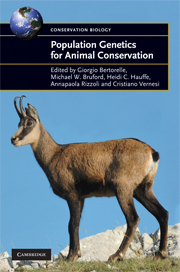Book contents
- Frontmatter
- Epigraph
- Contents
- List of contributors
- Foreword
- Acknowledgements
- 1 Introduction
- Statistical approaches, data analysis and inference
- Molecular approaches and applications
- From genetic data to practical management: issues and case studies
- Future directions in conservation genetics
- 14 Recent developments in molecular tools for conservation
- 15 Theoretical outlook
- Software index
- Species index (common name)
- Species index (Latin name)
- Subject index
15 - Theoretical outlook
from Future directions in conservation genetics
Published online by Cambridge University Press: 05 July 2015
- Frontmatter
- Epigraph
- Contents
- List of contributors
- Foreword
- Acknowledgements
- 1 Introduction
- Statistical approaches, data analysis and inference
- Molecular approaches and applications
- From genetic data to practical management: issues and case studies
- Future directions in conservation genetics
- 14 Recent developments in molecular tools for conservation
- 15 Theoretical outlook
- Software index
- Species index (common name)
- Species index (Latin name)
- Subject index
Summary
This review addresses a number of current issues in conservation genetics, and highlights possible future trends. The current and future role of statistical model-based inference in population genetics is discussed, particularly in relation to methods that focus on the analysis of haplotype networks. There are a number of current computational issues in model-based methods, for example convergence of Markov chain Monte Carlo (MCMC) with multiple loci, and suggestions for overcoming them are explored. In particular, potential future uses of Approximate Bayesian Computation in a conservation context are discussed. Another issue that is examined is the sensitivity of population genetic modelling to the specific assumptions used. Of particular concern is the potential for many different demographic scenarios to give rise to similar genetic data. A problematic area, but with great relevance to a more detailed dissection of the demographic antecedents of threatened populations, is the development of statistical methods to handle recombination and linkage disequilibrium in linked markers. With the improvement in our ability to inexpensively assay individuals and populations for multiple genetic markers, new directions have become possible in conservation genetics. One area is the use of multilocus genotypes to infer aspects of population structure. Another area is the detection of regions of the genome under adaptive selection. Potential future work with relevance to conservation is discussed, such as pedigree reconstruction purely from genetic data, and the definition of conservation units based on adaptive genetic differences.
INTRODUCTION
If we regard conservation genetics as a sub-discipline of population genetics, then, at least in its theoretical development, the latter is generally regarded as mature (Lewontin 1974). Broadly, the foundations for understanding how gene frequencies respond to drift, selection, immigration and recombination have already been laid down. However, there continue to be novel and, from a conservation perspective, useful, theoretical developments based on these foundations, particularly with regard to debates over the role of genetic factors per se in contributing to extinction risk (Whitlock et al. 2003).
- Type
- Chapter
- Information
- Population Genetics for Animal Conservation , pp. 345 - 373Publisher: Cambridge University PressPrint publication year: 2009



